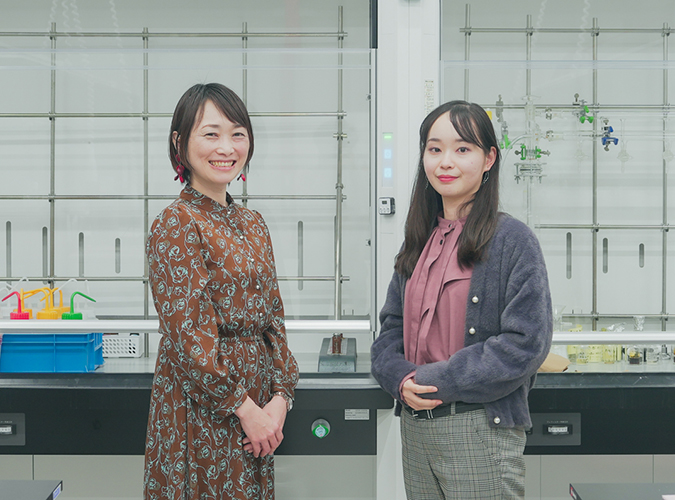留学でひらけたビジョンは
教育・開発分野での
国際貢献

OVERTURE
グローバルな環境に身を置き、多様な価値観を肌で感じながら、専門分野の学びを深める留学。今回は協定校派遣交換留学生(以下、交換留学生)としてブルネイ・ダルサラーム大学で学び、その経験から、新たに国際協力分野での貢献という目標を見出した包國 遥太さんを紹介します。
イスラム文化を深く知ろうとブルネイに留学
私が留学したブルネイ・ダルサラーム国(以下、ブルネイ)は、東南アジアの赤道直下に位置するボルネオ島にあって、面積は三重県とほぼ同じくらいの大きさで、国民の約80%がイスラム教徒という立憲君主制の国です。石油や天然ガスなどの豊かな地下資源に恵まれているので、国民はその恩恵を受けて経済水準は高く、社会福祉も充実している点が特長です。2021年8月から1年間、ブルネイ・ダルサラーム大学(Universiti Burunei Darussalam以下、ブルネイ大学)に交換留学し、ビジネスと経済を専攻しました。ブルネイを留学先に選んだ動機は、青山学院高等部時代に「平和・共生学習」において執筆した「平和・共生論文」で宗教をテーマにした際、イスラム文化に触れて関心を持ったことに端を発します。未知のイスラム文化を学び生活を体験してみたいという気持ちがあったこと、また近年目覚ましい経済発展を遂げている東南アジアという地域に行って学び、その中で世界共通語である英語力も向上させたいと考えたためです。
私は、コロナ禍による緊急事態宣言や休校など、最も厳しい制限下の2020年4月に、国際政治経済学部国際政治学科に入学しました。このままでは充実した大学生活を送れないのではないか、という強い危機感を覚えましたが、それが逆に留学を目指す強い原動力となり、すぐさま英語の勉強に取りかかりました。1年次に受験したIELTSの成績をもとに出願し、2020年中にブルネイ大学への交換留学の学内選考に合格しました。2年次後期からの留学が内定したものの、当時はパンデミックの影響でほとんどの国に渡航中止勧告が発令されていました。ブルネイへの渡航制限解除後は、入国条件のワクチン接種の見通しがたたず、出国直前まで先行き不透明な状況に置かれました。若年層のワクチン接種が難しい時期に、国際センターの方々が、接種を理由に留学を断念することがないように、と接種枠確保に尽力してくださったことが大変ありがたかったです。
 1958年に建造された「オールドモスク」とライトアップされたフレームの前で
1958年に建造された「オールドモスク」とライトアップされたフレームの前で 青山キャンパスの国際センターで留学後の報告
青山キャンパスの国際センターで留学後の報告
「外国人になる体験」で得た、英語力の向上と異文化理解の促進
ブルネイでは、1984年に英国からの独立後、バイリンガル教育政策が導入されているので、公用語のマレー語に加え英語が広く通用しています。大学の講義もすべて英語で行われ、論文の講読、メンバーとのディスカッション、レポートの執筆に至るまですべてを英語でこなしました。苦労も多くありましたが、結果的にはこの経験が英語によるコミュニケーション能力向上を促してくれました。
留学中に大きな刺激を受けた授業としてまず挙げたいのは、途上国経済が発展してきた過程を学んだ「Economic Development」です。講義は、強権的な政府が大胆な手法で開発・発展を進めたアフリカのルワンダ共和国と、豊富な天然資源がもたらす富を教育や福祉に投資したブルネイ、両国の歩みをケーススタディで比較するというものでした。この授業により、同じ途上国でも多様な発展の道筋があるのだと理解を深めることができたと感じています。また「International Relationship」では、東南アジアを取り巻く国際政治の様相をASEAN当事国の立場で考えることによって、日本に留まっていては身に付けることができない視点を獲得できました。
 湖での記念撮影。左後方の水に浮かんでいるのが包國さん。
湖での記念撮影。左後方の水に浮かんでいるのが包國さん。
また、ムスリム(イスラム教徒)の友人たちとの日常を通じ、彼らの文化や考え方を、1人の生活者として体験することができました。「ラマダン」の時期は、約1か月にもおよぶ断食を終えると同時にモスク前の広場に集まって屋台の料理を食べ、ラマダン明けを祝う盛大なお祭り「ハリラヤ」にも出かけました。また、ムスリムの女性が頭を覆う「ヒジャブ」について、日本で目にしていた映像から「黒の無地」という先入観を持っていましたが、ブルネイではカラフルなものを身に着けている方も多く、たいへん驚いた記憶があります。また、お酒を飲まないという戒律は守りながらも、ヒジャブは着用しないという女性とも友人になり、イスラム教徒の間でもさまざまな価値観が共存し、尊重し合う状況をこの目で見たことは大きな収穫でした。
初めての海外生活、留学の最大の魅力は何かと考えると、「外国人になってみる」という体験です。日本人が海外に出て行けば「外国人」になり、マイノリティ(少数派)の立場に身を置いて初めて気づくこと、物事の見方や考え方を広げる大きなきっかけになりました。
留学の礎になった国際政治学科での学び
留学前に本学で履修した「国際機構論Ⅰ(英語講義)」は学生の発言やプレゼンが多い授業で、主体的に取り組む姿勢が身に付きました。また、戦争がなぜ起こるのかというテーマを扱う「国際政治学Ⅰ(英語講義)」は、さまざまなデータをもとに数量的な分析から考察を進める授業でした。科学的な視点も用いて政治について思考する点が新鮮でいつも興味深く受講していました。国際政治学科で培ったこれらの知識や学修姿勢が土台となり、留学先でも深く実りある学びが実現できたのだと考えています。
また留学先で修得した科目の単位は、留学修了後、本学の単位に振り替える「単位認定制度」があり、この制度を利用して単位認定が可能となりました。青学を1年にわたり離れながらも、4年間で卒業できるのは大きなメリットです。

留学経験が海外インターンに発展
将来は国際協力で貢献できる人材に
ブルネイ留学中、私は日本に興味のある学生と交流する団体に所属し、この活動を通して国際協力・貢献の分野に強い関心を持つようになりました。海外で培った知識や経験を実際に生かしたい。留学修了後、青学での3年次後期授業が始まるまで2か月もある。この2か月をどのように過ごすのか?と考え、2022年の夏休みは、カンボジアの小学校で教育に携わるインターンシップ(以下、インターン)への参加を決めました。
カンボジアは、1970年~1990年代の内戦と混乱により、教育施設が破壊され、学校の教員を含む多くの知識人が亡くなったという悲しい歴史があります。現在では教育環境の改善は進められつつあるものの、教育を施す教員の人材育成面は十分な水準とは言えない。さらに英語教育が義務教育に含まれているものの、英語を教えることができる教師が不足している。このようなカンボジアの教育環境をめぐる問題に関心を寄せていたので、今回の海外インターン参加を決意しました。
現地では支援対象となる小学校で、英語と算数の授業を英語で行いました。教えることに加え、新たに支援対象となりそうな学校に出向いて、何が求められているかを調査して授業クラスを追加する、物資の調達を支援する等の活動に協力しました。児童たちには英語がほとんど通じないので、カンボジアの公用語であるクメール語を織り交ぜるなど、工夫しながら授業に努めていました。やがて児童たちの「できること」が徐々に増え、中には「英語の先生になりたい」と言ってくれる子どもが現れたりし、教育の確かな手応えを感じることができたことが嬉しかったです。
 プノンペンの隣にあるコンポンスプー州の小学校でのインターン。クラスの児童と学校周辺に住んでいる子どもたちとの一枚。
プノンペンの隣にあるコンポンスプー州の小学校でのインターン。クラスの児童と学校周辺に住んでいる子どもたちとの一枚。 遠方にある小学校を支援訪問。児童の学年は同一クラス内でもさまざま。
遠方にある小学校を支援訪問。児童の学年は同一クラス内でもさまざま。
ブルネイ留学中は大学寮に住んでいたこともあり、日常的に交流する相手は学生ばかりでした。一方、カンボジアでのインターンでは、支援対象の子どもたちを取り巻く多様な立場・年齢・職業の人々と緊密に関わり、暮らしに密着して相互理解を深めていかなければ、持続可能で質の高い支援にはつながらないと切実に思うようになりました。また、インターンという「働く」体験から、語学力はもちろん、専門性が必要だと痛感したので、卒業後は、まずは海外の大学院で学び、その後、企業で働く経験を通じて、専門知識と実用的な技能とを身に付けたいと考えるようになりました。
国際政治経済学部には、4年次後期から1年間、イギリスのエセックス大学大学院へ留学することで、青山学院大学の学士とエセックス大学の修士の学位を取得できるEssex大学大学院 Dual Degreeプログラム制度もあるので、これを利用することも視野に入れています。最終的には NGO や国際機関などに所属して、国際協力の分野で教育や開発などに貢献できる人材になりたいと考えています。
包國さんの交換留学スケジュール
-
<1年次> 2020年春
入学直後に交換留学を決意し、英語の勉強を開始
-
<1年次> 2020年夏
IELTS受験
-
<1年次> 2020年秋
交換留学出願・試験
-
<1年次> 2020年末
合格通知 ブルネイ・ダルサラーム大学への交換留学が決定
-
<1年次>2021年
諸手続きを開始
-
<2年次> 2021年8月
渡航・留学開始
-
<3年次> 2022年5月
帰国
-
<3年次> 2022年8月
カンボジアにて教育分野のインターン
※各科目のリンク先「講義内容詳細」は2021年度のものです。
国際政治経済学部 国際政治学科
青山学院大学の国際政治経済学部は国際社会への貢献をそのミッションとし、国際系学部の草分けとして創設されました。3学科×5コース体制のもと、専門性と国際性、現場感覚を重視した学びを実践しています。グローバルレベルの課題への理解を深め、エビデンスにもとづいて議論・討論するスキルを養成します。世界の多様な人々と協働し、新たな価値を創造する実践力を育みます。
国際政治学科では国際社会を国際政治学の観点からとらえます。2年次に選択する「政治外交・安全保障」と「グローバル・ガバナンス」のいずれのコースも、大幅に刷新された新しいカリキュラムの下で、国際政治学の「最新」を広く深く体系的に学びます。学びを通じて身に付けた能力は、近い将来に、国際社会の諸問題の解決のために大いに活かされることになります。

国際センター
国際センターは、大学の国際化に関わる教育支援と国際人育成をサポートしていきます。主な業務は、海外協定・認定校を対象とする「学生派遣」と「留学生の受入れ」、短期語学研修などのプログラムやイベント等の企画・運営、および青山学院中・高等部などの設置学校と大学間のグローバル化に関わる一貫教育体制のサポートなどを担います。国々の多様な文化や慣習および学生の異なる価値観を尊重しながら、海外大学と本学との連携をさらに強化・拡充していきます。

















































































































































































































































































































































































